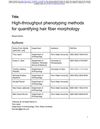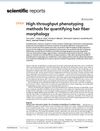 7 citations,
April 2011 in “Expert review of dermatology”
7 citations,
April 2011 in “Expert review of dermatology” The document concludes that patients with skin of color need specialized dermatological care and education to manage unique skin conditions effectively.
 46 citations,
April 2014 in “PLOS ONE”
46 citations,
April 2014 in “PLOS ONE” Gray hair may be caused by lower antioxidant activity in hair cells.
 April 2016 in “Journal of The American Academy of Dermatology”
April 2016 in “Journal of The American Academy of Dermatology” Using a niacinamide cream can improve life quality for breast cancer patients during chemotherapy.
 June 2021 in “Dermatologic surgery”
June 2021 in “Dermatologic surgery” Researchers suggest using a standard question and 5-point scale to measure patient satisfaction with acne scar treatments.
 1 citations,
August 2023 in “International journal of pharmacy & integrated health sciences”
1 citations,
August 2023 in “International journal of pharmacy & integrated health sciences” Cosmeceuticals are popular for their skin health benefits and anti-aging effects.
 1 citations,
January 2023 in “Journal of Clinical Medicine”
1 citations,
January 2023 in “Journal of Clinical Medicine” A new hair restoration technology was found to effectively increase hair thickness, density, and growth, while reducing hair loss and improving scalp health, with no side effects.
 10 citations,
August 2018 in “Experimental Dermatology”
10 citations,
August 2018 in “Experimental Dermatology” Decorin helps hair cells grow and move, and keeps hair growth phase going in mice.
 87 citations,
April 2018 in “Biochemical and Biophysical Research Communications”
87 citations,
April 2018 in “Biochemical and Biophysical Research Communications” Exosomes from dermal papilla cells can help grow hair and might treat hair loss.
 1 citations,
November 2020 in “bioRxiv (Cold Spring Harbor Laboratory)”
1 citations,
November 2020 in “bioRxiv (Cold Spring Harbor Laboratory)” Quantifying hair shape is better than using racial categories for understanding hair characteristics.
 April 2024 in “International journal of women's health”
April 2024 in “International journal of women's health” Adult female acne is a complex condition that can worsen with menopause, requiring holistic treatment and tailored skincare at different life stages.
 66 citations,
January 2000 in “Dermatology”
66 citations,
January 2000 in “Dermatology” Dandruff is a common, winter-worsened scalp condition linked to inflammation and microorganisms, treatable with products like ketoconazole, and may affect hair loss.
 78 citations,
October 2020 in “Experimental Dermatology”
78 citations,
October 2020 in “Experimental Dermatology” Hidradenitis suppurativa is caused by genetic factors, inflammation, bacteria, hormones, and lifestyle factors like obesity and smoking.
 14 citations,
February 2020 in “Scientific reports”
14 citations,
February 2020 in “Scientific reports” Telocytes in the scalp may help with skin regeneration and maintenance.
 5 citations,
July 2006 in “Contact dermatitis”
5 citations,
July 2006 in “Contact dermatitis” Ammonium bisulfite in hair bleach can cause facial eczema.
 21 citations,
August 2011 in “Body Image”
21 citations,
August 2011 in “Body Image” Acceptance reduces hair loss distress and medical consultations; coping mechanisms increase them.
 4 citations,
November 2011 in “Archives of Dermatology”
4 citations,
November 2011 in “Archives of Dermatology” Hamilton scale imprecise, hair shaft diameter decreases, stem cell transplant regrows hair, ECP ineffective for alopecia areata universalis.
 1 citations,
December 2019 in “Formuly farmacii”
1 citations,
December 2019 in “Formuly farmacii” Many people suffer from hair loss, which is caused by a disruption in hair growth, and there is a need for personalized treatments and new drugs.
 February 2024 in “Journal of the European Academy of Dermatology and Venereology”
February 2024 in “Journal of the European Academy of Dermatology and Venereology” Baricitinib is effective and safe for long-term use in severe alopecia areata, improving hair regrowth and quality of life with few side effects.
 7 citations,
August 2018 in “Journal of cosmetic dermatology”
7 citations,
August 2018 in “Journal of cosmetic dermatology” Chemical hair straightening improves smoothness and shine but may cause side effects, suggesting a need for safer methods.
 September 1995 in “American Journal of Contact Dermatitis”
September 1995 in “American Journal of Contact Dermatitis” Antiyeast treatments work better for seborrheic dermatitis than steroids, and other findings include increased skin bacteria under plastic wrap, a nasal cell defect in Staphylococcus aureus carriers, quick resolution of certain skin reactions, high rubber latex allergy in spina bifida patients, and glyceryl monopentadecanoate's effectiveness for male hair loss.
1 citations,
January 2020 in “Indian journal of dermatology, venereology, and leprology” CD117 and platelet-derived growth factor receptor α may play a role in alopecia areata.
1 citations,
September 2021 in “Dermatologic Therapy” AC5 improves hair loss and hair quality with high satisfaction rates.
 September 2024 in “Heliyon”
September 2024 in “Heliyon” Repeated hair dyeing significantly damages hair.
 September 2024 in “Journal of Cosmetic Dermatology”
September 2024 in “Journal of Cosmetic Dermatology” Low-dose oral minoxidil can cause serious side effects like heart issues, so use the lowest effective dose.
 January 2024 in “JEADV clinical practice”
January 2024 in “JEADV clinical practice” Patients were highly satisfied with shared medical appointments for hair loss treatment.
 18 citations,
January 2016 in “Elsevier eBooks”
18 citations,
January 2016 in “Elsevier eBooks” Nanotechnology improves cosmetics' effectiveness and safety.
 February 2009 in “Journal of the American Academy of Dermatology”
February 2009 in “Journal of the American Academy of Dermatology” Transverse sections are better for non-scarring hair loss, vertical sections are better for lichen planopilaris, and either method works for other scarring hair loss types.
 4 citations,
June 2021 in “Scientific Reports”
4 citations,
June 2021 in “Scientific Reports” Hair fiber shape and curvature are not significantly linked when ancestry is considered.
 77 citations,
January 2015 in “International Journal of Biological Macromolecules”
77 citations,
January 2015 in “International Journal of Biological Macromolecules” Chitosan nanoparticles improve minoxidil delivery to hair follicles for better alopecia treatment.
 38 citations,
January 2015 in “Journal of Cosmetic Dermatology”
38 citations,
January 2015 in “Journal of Cosmetic Dermatology” The nutritional supplement improved hair density and reduced hair loss in women with female pattern hair loss.




























